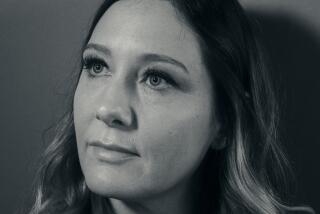Flash backward
- Share via
Crouching on the desert sand, Dick Baugh twirls a crude wood tool against another piece of wood. In seconds, he ignites a few wisps of glowing embers. Fire. Making it by friction is a simple joy he never tires of. “I wanted to be a cave man since I was 10 years old,” he says.
With electrical engineering degrees from Caltech and Stanford University and a highflying research gig at Hewlett-Packard Co., Baugh, 66, evolved too quickly to be a Neanderthal. He has no plans to ditch his house in Palo Alto or his “excellent life in civilization,” but Baugh is hooked on making fire without matches because it’s another engineering puzzle he gets to crack.
A few tents away, Tony Yu is chipping away at a small chunk of obsidian. As each flake breaks off, he slowly hews the stone into an arrowhead. Yu is wearing buckskin pants and coyote-and--wolf-fur vest he made. “Generally if I need something,” the 25-year-old says, “I make it.”
If this was the next season of “Survivor,” you might want to recruit these guys for your tribe. But Baugh and Yu have too many survival skills and play too well with others to satisfy Hollywood’s appetite for backstabbing teammates who have little interest in real outdoors skills.
Both men consider themselves neo-aboriginals, or “abos,” and their passion is primitive technology. Give them a gourd, and they’ll carve it into a bowl and yank two twigs off a bush for chopsticks. They read animal tracks like a Thomas Guide. They turn weedlike plants into medicinal manna.
Some abos are drawn to primitive arts as an escape from computers, commuting, consumerism. Others view it as a primer on wilderness survival. For many, it is also a living anthropology lesson, a chance to dig up one’s ancient hunter-gatherer roots, a glimpse of how our ancestors lived solely off the land for tens of thousands of years.
However, many abos don’t actually live like cave men.
Baugh and Yu joined 200 other like-minded thinkers at an annual primitive skills gathering last February in the sparse Sonoran Desert, south of Phoenix. Most folks were bundled in fleece and Gore-Tex, camping next to their SUVs while slathering on gobs of sunscreen. The mess tent had a full-size oven hooked up to a propane tank that turned out dozens of loaves of bread in a snap. (Not as exotic as the rustic clay oven built here, but a lot faster.)
Winter Count is one of the largest events of its kind in the West, and the weeklong workshop is equal parts outdoors convention, family reunion and primitive skills teach-in. For $245, a participant gets two hot meals a day, rustic camping (with modern conveniences of portable toilets and a water truck) and an agenda of more than 25 daily classes that teach skills including bow-and-arrow construction and tanning animal hides using boiled cow brains.
One of the oldest gatherings, Rabbitstick, dates to the 1970s and is held each fall in Idaho. David Wescott, who runs Rabbitstick and Winter Count, operated the Boulder Outdoor Survival School for 10 years and was a consultant to the scriptwriter for the Tom Hanks’ movie “Castaway.”
People are lured to primitive skills, he says, by the common experience of wanting to be in balance with nature. A low-key, jeans-and-cowboy-hat kind of guy, Wescott, 56, makes it clear the gatherings are not boot camps for anti-government survivalists, nor are they Rainbow Tribe love-ins. In fact, it is difficult to pin down the typical abo profile.
At Winter Count, they are Mormons, Jews, agnostics. Vegans and animal trappers. Retirees and families. Urbanites with mortgages and yurt owners without electricity. They bring RVs, North Face tents and homemade tepees. They try to leave politics at home.
A good number are like Baugh, “weekend abos” who don’t want to give up a comfortable life in the modern world. But a small core are deep into the primitive lifestyle. They live in caves and on remote mountaintops, shunning the conveniences of the 21st century.
Yu, the son of two Chinese American doctors who “have tried their best to stop me from doing this,” says his interest in primitive skills was piqued while he was a student at Carnegie Mellon University. After graduation, he watched friends go off to high-paying office jobs while he went full tilt in the other direction.
Last year, Yu scraped by on $5,000. He teaches bow making and English, filling in with odd jobs or graphic design, and cuts expenses by bunking with friends. He has no permanent residence, but he does own a car.
Lisa Shepherd, 38, who is known as Lynx, and her partner, Doug Crist, 41, (who usually goes by his nickname Digger), gave up electricity, running water and a telephone more than a decade ago.
They’ve lived in a yurt on a 20-acre spread in northwest Montana for nine years. Before that, they lived in a tepee.
After breakfast one morning at Winter Count, an announcement is made about a producer who wants to pitch a possible show to PBS.
The reaction is muted. Some grumble about how primitive skills and abos might be wrongly portrayed.
A few minutes later, it is time for classes to start again. People scatter across the arroyos and past scrawny mesquite bushes to find their instructors. In the flint knapping circle, the only disturbance is the rhythmic striking of tool against rock. The constant chipping, crunching, flaking of stone.
“We are here because our ancestors were innovators,” says Steve Lowther, a computer programmer from Mesa, Ariz., who first tried to make arrowheads as a kid. “The people who innovate are the ones who survive.”


